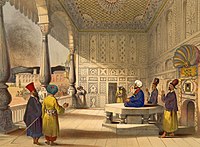Abdul Qadir (Afghan communist)
Abdul Qadir | |
|---|---|
عبد القادر دگروال | |
Mohammed Daoud Khan (as President) | |
| Succeeded by | Nur Muhammad Taraki |
| Personal details | |
| Born | Abdul Qadir 1944 Soviet-Afghan War |
| History of Afghanistan | |
|---|---|
 | |
| Timeline | |
| 410–557 | |
| Nezak Huns | 484–711 |
He served as the acting
Qadir's second term took place during the
Early life
Abdul Qadir was born in Herat in the Herat Province of the Kingdom of Afghanistan in 1944.[2] He was an ethnic Tajik whose family hailed from Herat Province.[3][4]
He went to the military school run by the Afghan Armed Forces and was trained as the pilot, qualified to fly the Mig-15, Mig-21, and Su-7, in the Soviet Union.[2] His education comes from the Soviet Union, having studied and excelled in Russian staff colleges.[2] During his career in the Afghan Air Force, he joined PDPA and later aligned with the Parcham (Flag faction).[2]
The Republican Coup of 1973
In 1973, Colonel Qadir helped maneuver the coup d'état led by former Prime Minister Dawood Khan with support by General Abdul Karim Mustaghni, who had been Chief of General Staff of the armed forces. President Dawood Khan promised radical land reform, the legalisation of political parties and other reforms. Parcham was offered four minister posts in Daoud's government. As a Parcham member, Qadir was nominated vice chief of the Afghan Air Force, while another Parcham supporter, Major Zia Mohammadzi Zia, was appointed chief of the Afghan Army. However, by 1974 Daoud removed and downgraded many of the Parcham ministers in the government. Qadir was thus downgraded to head of Kabul's Military abattoir. Many Parcham supporters, including Colonel Qadir, shifted allegiance to Khalq.
In April 1978 Daoud and his hardline interior minister, General
The Saur Revolution
He also ordered the attack against the
At 19:00 on 27 April, Chairman Qadir made an announcement over Radio Afghanistan, in the
For the first time in the history of Afghanistan, the radio declared, the last remnants of
tyranny, despotism... has ended, and all powers of the state are in the hands of the people of Afghanistan.
The
Member of the Khalqist Government
He became
The policy of Taraki and
The party was unable to make Qadir a true
Marxist–Leninist, prepared to withstand any negative influence. That was our mistake.
Member of the Parchamite Government
After the Soviet invasion of Afghanistan in 1979 that assassinated Hafizullah Amin, Qadir was released from jail under the new regime of Babrak Karmal, the political posts he held in the PDPA before being sent to jail were restored. He served once again as Minister of Defence (1982–1985) during the Babrak Administration.[5]
After the Soviet Invasion, Kabul was put in a state of siege. The bridges were blocked, barriers and hidden ambushes were set up on all the roads leading into the city. Qadir was made commander of the city. As part of the changes in the leadership of the country, he resigned from the
Later years and death
After some years of living in
Views
At a mourning ceremony in Moscow to honour the memory of Ahmad Shah Massoud
"Though Massoud and I used to be enemies I am sure he deserves great respect as an outstanding military leader and, first of all, as a patriot of his country".[9] - 2001-09-21
References
- ^ "Relacje polsko-afgańskie - Embassy of the Islamic Republic of Afghanistan, Warsaw - Ambasada".
- ^ ISBN 9780810878150. Retrieved 13 October 2019.
- ISBN 978-1-5381-4929-4.
- ISBN 978-1-85109-407-3.
- ^ ISBN 1851094024. Retrieved 2009-03-24.
- ^ Révolution en Afghanistan | INA (in French). Retrieved 2024-04-05 – via www.ina.fr.
- ^ Vasili Mitrokhin (July 2009). "The KGB in Afghanistan". Woodrow Wilson International Center for Scholars. Retrieved 2009-03-24.
- ^ В Кабуле скончался участник Саурской революции генерал Абдул Кадир Хан [Participant in the Saur Revolution, General Abdul Kadir Khan, died in Kabul], 23 April 2014, retrieved 13 November 2019
- ^ "Pravda.RU Afghans Living In Russia Held Mourning Ceremony In Moscow". 2001-09-23. Archived from the original on 2001-09-23. Retrieved 2019-04-17.
External links
- Abdul Qadir Dagarwal's obituary (in Persian)
- » В Кабуле скончался участник Саурской революции генерал Абдул Кадир Хан (in Russian)
